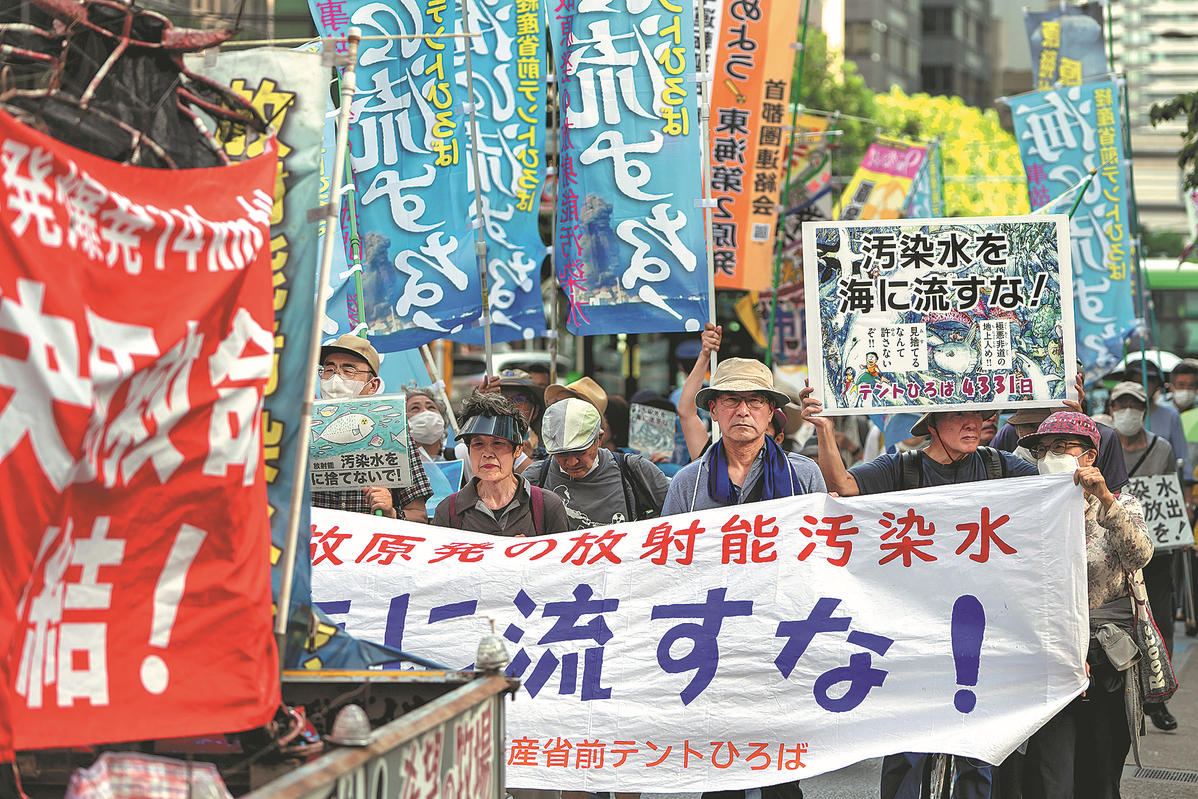Decision on nuclear water irresponsible
By Jiang Chenglong | China Daily | Updated: 2023-07-22 07:08

Japan dumping effluent into the sea is unprecedented and unjustified
Japan's decision to discharge nuclear-contaminated water from its Fukushima Daiichi Nuclear Power Station lacks justification, given it hasn't fully listened to the opinions of all international stakeholders, experts said.
They also expressed concerns over the uncertain long-term effects Japan's decision has on the environment and health, as the world has no precedent to follow regarding the massive discharge of contaminated water from a major nuclear accident into the sea.
Liu Xinhua, chief expert and researcher at the Nuclear and Radiation Safety Center of the Ministry of Ecology and Environment, said the judgment of justification is a very complex issue that requires the participation of all stakeholders in order to reach a solution that is accepted by all.
"If your decision would affect me, then you have to fully seek my opinion, and it requires the participation of all parties involved," he said.
He pointed out that Japan has not conducted sufficient communication with neighboring countries and its decision has not adequately reflected their opinions in this regard, so the decision lacks justification.
In addition, Wang Jianlong, a professor at Tsinghua University's Institute of Nuclear and New Energy Technology, expressed great concern about Japan's decision, given that it is the first time water polluted by a major nuclear accident would be discharged into the sea, which he said is completely different from the discharge of treated water from the normal operation of a nuclear power plant.
The contaminated Fukushima wastewater was used to cool down the molten core, which released a large amount of radionuclides, including long-lived isotopes, whereas regular effluents from nuclear plants rarely come into contact with the fuel core and thus contain almost none of those toxic elements, he said.
Furthermore, tritium is one of the main radioactive nuclides in the Fukushima nuclear-contaminated water, but it is difficult to remove, he said, stressing that the long-term effects of this substance on the environment, particularly on ecosystems, are currently unknown.
"The impacts caused by the discharge of Fukushima's nuclear-contaminated water are not evident in just the next three to five years because some effects are long-term, chronic and cannot be assessed at present," said the professor.
"Tritium, like water, can be absorbed by the human body through biological concentration, such as through food consumption," Wang said. "The harm caused by tritium entering the body is very significant, leading to possible damage to DNA, causing hereditary changes. This potential long-term impact is uncertain."
He believes that it's irresponsible to decide to release nuclear-contaminated water into the sea without reaching a conclusion on many issues.
Earlier this month, the International Atomic Energy Agency released its Comprehensive Report on the Safety Review of ALPS-treated Water at the Fukushima Daiichi Nuclear Power Station.
Despite rendering approval, the IAEA's report pointed out Japan's Advanced Liquid Processing System cannot remove all the radionuclides in the nuclear-contaminated water. Data released by Japan show over 70 percent of the ALPS-treated water does not meet standards and thus needs further treatment.
Doubts also remain over the accuracy of the data used to draft the report, as Tokyo Electric Power Company Holdings has repeatedly covered up or fabricated data in recent years. The IAEA's review and assessment were based on data and information provided unilaterally by Japan, and its inter-laboratory comparison relied on a small number of samples collected by Japan.
Thus, a reasonable question should be posted on the authenticity of data and the accuracy of information, said Liu, the chief expert, underscoring the necessity to set up an independent third-party and multilateral supervision team.
























